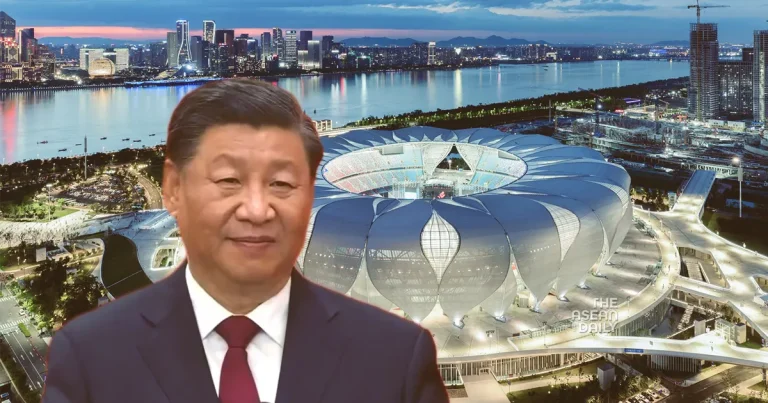23-9-2023 (BEIJING) Chinese President Xi Jinping will officiate the opening ceremony of the Asian Games in Hangzhou on Saturday, marking the commencement of this grand sporting event that boasts a larger contingent of athletes than the Olympics.
Delayed by a year due to China’s stringent zero-Covid measures, the Asian Games will witness the participation of over 12,000 competitors from 45 nations across Asia and the Middle East, who have converged in the eastern city to showcase their skills in 40 different sports.
President Xi is scheduled to inaugurate the proceedings officially in Hangzhou’s Olympic stadium, located in one of China’s most prosperous regions. Notable guests, including Syrian President Bashar al-Assad, will be in attendance. This visit marks President Assad’s first trip to China since the outbreak of war in Syria in 2011. Leaders from Cambodia, Kuwait, Nepal, and other countries, who are allies of China, will also be present, according to state media reports.
Jung-Woo Lee, a sport policy expert at the University of Edinburgh, expressed his views on the Games, stating, “The Games are likely to be China’s post-pandemic soft power exercise in the fully packed stadium with the presence of political and business leaders in Asia,” in an interview with AFP.
Nevertheless, the Games have already encountered a dispute between China and New Delhi. India’s sports minister’s visit to Hangzhou was cancelled on Friday after three women martial arts fighters from the Indian state of Arunachal Pradesh claimed that they were denied accreditation. China, however, contested this allegation. Arunachal Pradesh is a northeastern state in India and is claimed almost entirely by Beijing, which refers to it as “South Tibet.”
China’s reputation as a sporting destination suffered a severe blow during the initial three years of the pandemic. Stringent lockdowns and travel restrictions led to the cancellation of almost all international events in the country.
Inclusive Games –
The host nation is the overwhelming favorite to top the medals table, boasting a massive delegation of nearly 900 athletes. Japan and South Korea are expected to compete for second place.
North Korea, after nearly three years of isolation from the global sporting arena, has sent a delegation of nearly 200 athletes to participate in the Games.
The athletes will vie for medals in 40 sports, including athletics, swimming, football, bridge, and a range of regional specialties such as dragon boat racing, Chinese martial art wushu, and kabaddi, a popular contact sport on the Indian subcontinent.
Nine sports, including boxing, breakdancing, and tennis, will serve as qualifiers for the Paris Olympics next year.
Wei Jizhong, the honorary life vice-president of the Olympic Council of Asia, emphasized the importance of offering opportunities to as many athletes as possible. He said, “We are open to all. This means our Games are not concentrated only for elite sportspeople. When athletes from developing countries win medals, their people are happy, their government is happy, and they support sport. Sport holds a high social position. So, I think this policy of the Olympic Council of Asia is successful.”
The Games will be held across 54 venues, including 14 newly constructed ones, primarily in Hangzhou but also extending to cities as far as Wenzhou, located 300 kilometers (180 miles) south.
The “Big Lotus” Olympic stadium, with a seating capacity of up to 80,000, will be the centerpiece, hosting athletics events as well as the opening and closing ceremonies.
Hangzhou, a city of 12 million people and a one-hour bullet train ride from Shanghai, is often regarded as the unofficial hub of China’s tech industry. The Games will showcase advanced technologies such as driverless buses, robot dogs, and facial recognition systems.
Furthermore, the Asian Games in Hangzhou will be the first cashless Games, as the city itself has transitioned into a cashless society.
Organizers are also emphasizing their commitment to environmental sustainability, implementing a low-carbon policy that ensures venues are powered by ‘green’ electricity.




